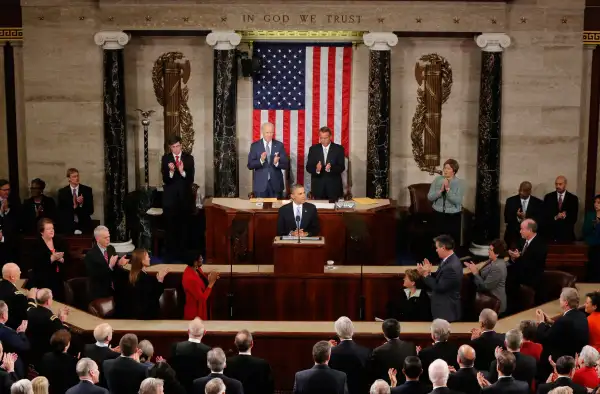What Every Consumer Should Know Before Watching the State of the Union

This year, President Obama broke with tradition and started previewing his State of the Union proposals in the two weeks before the big event. He went to Tennessee to talk about community college, to Iowa to talk about broadband, to the Federal Trade Commission to talk about identity theft, and even to LinkedIn, where his senior adviser published his plan about paid time off.
As a result, we already have a pretty good idea of what we're going to hear Tuesday night—and what it actually means. Here's Money's take on Obama's proposals.
1) Obama wants to raise taxes on the rich and give credits to the less-rich; Republicans say, "Yeah, right."
On Saturday, the White House announced a proposal to raise the capital gains tax from 25% to 28% and close what's sometimes called the "trust fund loophole." Obama wants to use the revenue to create a $500 tax credit for families with two working spouses; expand the credits available to families with children; expand the education tax credit for college students; and force businesses without retirement plans to automatically enroll workers in IRAs. Republicans have said this plan is a nonstarter.
While political observers agree that these ideas stand little chance of becoming law, consider this Obama's opening argument in the coming debate about tax code reform. Read more >>
2) Obama's broadband plan might just fix the internet.
Think of it as the internet's "public option." Some cities, like Chattanooga, Tenn., have much faster internet than the rest of us. That's because municipalities have built their own broadband networks to compete with internet providers like Comcast and Time Warner Cable, driving prices down and speeds up.
So why won't your town do the same? Because it's often illegal—19 states have laws preventing municipalities from creating their own networks. Obama plans to ask the Federal Communications Commission to override these laws. We don't yet know if the FCC has the authority to do that, but if it does, Obama's plan could change the way Americans access the internet. Read more >>
3) You already have identity fraud protection tools that are better than the ones Obama proposed.
Obama's plans to fight identity theft aren't nearly as ambitious. First, he'll call on Congress to pass a new law requiring companies to tell you within 30 days if your personal data is exposed. Second, he'll call on banks and financial institutions to give you access to your credit score for free.
But that won't do much to protect your money. Most states already have even stricter laws about security breach notifications, and by the time an identity thief has tanked your credit score, it's way too late. Instead, you're better off with the tools you already have: chip-and-signature credit cards and free credit reports. Here's what you can do today to beef up your fraud protection. Read more >>
4) President Obama will push for paid sick leave and paid maternity leave—but look to your city hall instead.
The United States lags behind the rest of the world when it comes to paid time off: 88% of American workers have no paid family leave, 39% have no paid sick leave, and 15% don't even have unpaid leave. Obama wants to change that, starting with the Healthy Families Act, a bill that would let workers earn up to seven days of paid sick leave. He also wants to sign a memorandum giving federal workers at least six weeks of paid leave after a child is born.
But listen for more details about his third idea, to help states and towns start their own sick leave programs. Local government has been leading the way on this issue: California, New Jersey, and Rhode Island offer paid family leave, and more than a dozen cities have started offering paid sick days. Change seems more likely at the local level, so what specifically does Obama want the federal government to do? Read more >>
5) There's not much hope for the free community college plan—but that's okay.
Obama wants to offer free community college to about 9 million students every year. If you think that sounds great, don't get too excited. Experts say the plan is dead on arrival—it's too expensive, Republicans will never support it, and community colleges wouldn't even be prepared for the influx of students. But there are already a ton of ways to take community college classes for free, or close to it. Read more >>
6) Lower mortgage insurance premiums will save homeowners money. But will that really help the housing market?
The Federal Housing Administration plans to lower government mortgage insurance premiums from 1.35% of the loan amount to .85%. That translates to a savings of about $900 a year. The hope is that will encourage more Americans—especially first-time buyers—to enter the housing market. But there are other reasons why this demographic hasn't started shopping yet. Plus, Republicans are afraid the change could put more homeowners at risk of default. Read more >>
7) Book your trip to Cuba today.
Here's the rare foreign policy issue with implications for your spring break: Pack your bags for Havana! While the announcement wasn't part of Obama's State of the Union "spoiler" tour, Obama is sure to talk about his decision to reestablish diplomatic ties with Cuba—and new travel rules went into effect on Friday.
Starting January 16, you no longer need a special government license to travel to Cuba, and neither do airlines or travel agents. Since the rules have been loosened, prices are expected to fall—but make your plans before demand picks up. Read more >>
